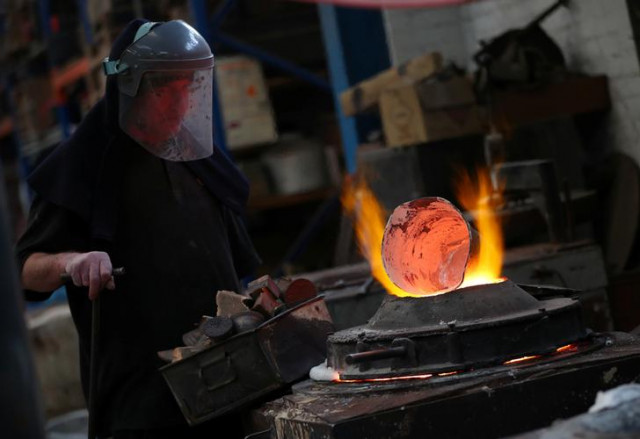Make money, do good: Women and young invest with a purpose
Women hold 30 per cent of global private wealth, according to reports

A worker tends to burning bronze during the manufacturing process of a British Academy of Film and Television Awards (BAFTA) mask at a foundry in west London, Britain. PHOTO: REUTERS
UBS, a global financial services company, said banks needed to create so-called impact investing products, which further global development goals by supporting sectors such as clean energy, education and healthcare.
“The United Nations Sustainable Development Goals identified a funding gap of over $2 trillion a year for the next 15 years that will only be filled by large scale business and investment,” James Gifford, head of impact investing at UBS, said at a breakfast briefing with reporters.
Investing In CPEC: ICCI wants incentives for start-ups
The UN goals - set in 2015 - bind nations to improve lives in all countries by ending poverty and hunger, fighting inequality and conquering climate change.
But with many governments short on cash and long on commitments, UBS said other sources of funding were vital to meet the UN shortfall.
Philanthropy is one option, private investment another.
The Gates Foundation is one of the world’s richest philanthropic institutions and has $40 billion - 2 per cent of what UBS think is needed to plug the UN shortfall.
The foundation puts money into areas such as health, sanitation and agricultural development in developing countries with the goal of creating more healthy, productive lives.
As to smaller investors, UBS said women and people born between the years 1982 and 2000 - so-called millennials - were driving the shift into investing with a purpose beyond profit.
‘Investing in girls’ education is the key to advancement’
The number of global impact investing funds created before 2004 totaled 31 - by 2016 that had risen to 420, according to ImpactBase, a website that lists impact investments.
Fund managers are also reporting higher levels of interest about impact investing, according to a 2017 report by the Global Impact Investing Network.
Gifford said millennials were more interested in sustainable living and this ethos informed their money decisions.
“Similarly, all the surveys are showing that women have a higher affinity for sustainability in investment and business,” Gifford said.
Women hold 30 per cent of global private wealth, according to a report by Boston Consulting Group, a US-based management consultancy. It expects women’s wealth to grow 7 per cent a year, which Gifford put down to the rise of female entrepreneurs.
UBS says it has responded to the demand for impact investing by giving investors options to address social issues, such as helping military veterans find employment.
That fund tracks the price of US companies actively encouraging the employment of veterans, who suffer more unemployment than civilians, according to the Labor Department.
UBS clients also invested $325 million in the Rise Fund, which counts Irish rock star Bono among its co-founders and aims to achieve “measurable, positive social and environmental outcomes alongside competitive financial returns.”
Investments are changing partly because the economy is more transparent, said Gifford.
He cited photos showing clothing labels in the rubble of the collapsed Rana Plaza factory, which killed 1,100 workers in Bangladesh in 2013, as an example.
Inspire and empower: Importance of investing in youth stressed
The pictures showed that Western brands had people in their supply chain working in unsafe conditions, raising awareness about corporate responsibility.
“There is nowhere to hide for unethical companies. The lowest income people in the world now have smartphones and they are one or two clicks away from a journalist,” said Gifford.
The amount of money going into impact investing increased by 18 percent annually between 2013 and 2015, according to the Global Impact Investing Network, which monitors market activity.



















COMMENTS
Comments are moderated and generally will be posted if they are on-topic and not abusive.
For more information, please see our Comments FAQ